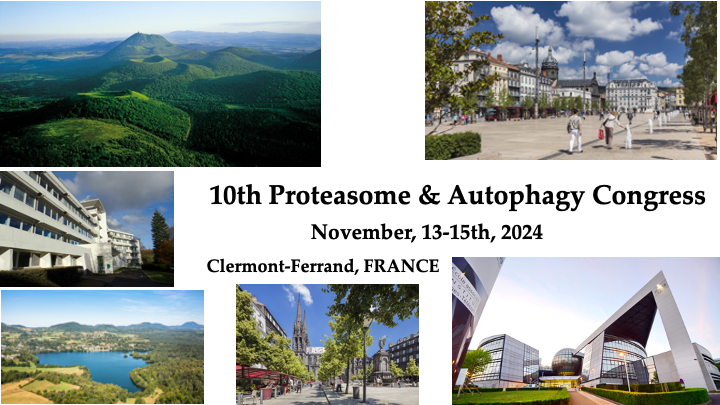
|
|
|
ProgramWednesday 13, November 7:45 – 8:45 Registration and poster installation 8:45 – 9:00 Welcome to the 10th Proteasomes & Autophagy Congress Session 1: Proteasomes, Structure & Function. Chairs: 9:00 – 9:30 DANIEL FINLEY Harvard Medical School, Boston, U.S.A. Proteasome inhibition by Ecm29 9:30 – 10:00 SHIGEO MURATA University of Tokyo, Bunkyo-ku, Tokyo, Japan Molecular mechanisms regulating proteasome function 10:00 – 10:15 JIMENA MUNTANER Biochemical and Structural characterization of a complex involved in chaperone- assisted UPS degradation 10:15 – 10:45 Coffee break 10:45 – 11:45 Speed Poster session 11:45 – 12:15 MICHAEL GLICKMAN Technion–Israel Institute of Technology, Israel 1, 2, 3, 4, can I have a little more DUBs on the proteasome… 12:15 – 13:45 Lunch 13:45 – 15:00 POSTER SESSION
Session 1, continued: Proteasomes, Structure & Function. Chairs: 15:00 – 15:30 MARIE-PIERRE BOUSQUET Institut de Pharmacologie et de Biologie Structurale, CNRS, Université Paul Sabatier, Toulouse, France Dissecting proteasome diversity in health and in neurodevelopmental and auto-inflammatory proteasomopathies using Mass Spectrometry as a Swiss army knife
15:30 – 16:00 JOHN HANNA Harvard Medical School, Boston, U.S.A. Mechanism of Assembly-Coupled Autocatalytic Activation of the Proteasome 16:00 – 16:15 AMELIE BOSC-ROSATI Mass spectrometry combined approaches highlight a defect in proteasome 20S assembly in patients with either immune or neurological disorders 16:15 – 16:45 ANDREAS MARTIN The thioredoxin-like protein TXNL1 binds the human 26S proteasome in a conformation- specific manner during substrate processing 16:45 – 17:15 Coffee break 17:15 – 17:45 SILKE MEINERS Research Center Borstel/Leibniz Lung Center, Borstel, Germany Regulation of the immunoproteasome in chronic inflammatory diseases 17:45 – 18:00 EYAL GUR A unique mechanism for tag recycling by the bacterial proteasome 18:00 – 18:15 SILVIA SALAS PINO Limiting 20S proteasome assembly leads to unbalanced nucleo-cytoplasmic distribution of 26/30S proteasomes and chronic proteotoxicity in fission yeast. 18:15 – 18:45 NIKI CHONDROGIANNI Institute of Chemical Biology, National Hellenic Research Foundation, Athens, Greece Unravelling the Regulatory Mechanisms and the Outcomes in Ageing and Age-Related Diseases 19:00 Social event
Thursday 14, November Session 2: Ubiquitination, Deubiquitination & Ub-like modifications. Chairs: 8:30 – 9:00 ALFRED CO VERTEGAAL Leiden University Medical Center, Netherlands Targeting epigenetic regulation and post-translational modification with 5-Aza-2' deoxycytidine and SUMO E1 inhibition augments T-cell receptor therapy 9:00 – 9:30 SONJA LORENZ Max Planck Institute for Multidisciplinary Sciences, Goettingen, Germany Conformational regulation of the GTPase-interacting ubiquitin ligase HACE1 9:30 – 9:45 INDRAJIT SAHU Can cAMP/cGMP-driven signals induce ubiquitination & degradation of target proteins by 26S proteasomes in human proteinopathies? 9:45 – 10:00 NILA VAN OVERBEEK A Chemogenetic CRISPR Knock-out Screen Uncovers Synergy Between Ubiquitin Signalling and C16orf72/HAPSTR1 for S-phase Entry 10:00 – 10:30 Coffee break 10:30 – 11:30 SIMON S WING McGill University, Montreal, Canada Keynote lecture: Twists and turns in the study of deubiquitination 11:30 – 12:00 MICHAEL CLAGUE ISMIB, University of Liverpool, United Kingdom Diverse routes to mitophagy governed by ubiquitylation and mitochondrial import 12:00 – 12:15 MANUEL S RODRIGUEZ Role of the ubiquitin ligase TRIM24 in the UPS-ALS crosstalk under proteotoxic stress conditions in mantle cell lymphoma 12:15 – 12:30 ANGELA MABB Identification of Neuronal E3 ubiquitin ligase substrates for RNF216 using Orthogonal Ubiquitin Transfer (OUT) reveals a crosstalk with DUBs 12:30 – 14:00 Lunch 14:00 – 15:30 POSTER session
Session 2, continued: Ubiquitination, Deubiquitination & Ub-like modifications. Chairs: 15:30 – 16:00 ROSA BARRIO Center for Cooperative Research in Biosciences (CIC bioGUNE), Derio, Spain New strategies to study the role of Ubiquitin-like modifications during development and disease 16:00 – 16:30 KATRIN RITTINGER The Francis Crick Institute, London, United Kingdom. Identification of RING E3 pseudoligases in the TRIM protein family 16:30 – 17:00 Coffee break 17:00 – 17:30 MICHAEL RAPE Molecular and Cellular Biology (MCB) department at UC Berkeley, USA Stress signaling at the crossroads of development and disease 17:30 – 17:45 DAYANA SHAGIDOV Unraveling the molecular basis of UCHL1’s protective role in Alzheimer’s disease 17:45 – 18:00 JUN XU Sequential post-translational modifications of DMTF1β oncogene
19:30 Gala Dinner
Friday 15, November Session 3: Autophagy. Chairs: 8:30 – 9:15 CHRISTIAN BEHRENDS Ludwig-Maximilians-Universität (LMU) München, Germany.
Identifying ubiquitin ligases driving lysosomal membrane damage response processes 9:15 – 9:30 MARIO MAUTHE A chaperone/proteasome-based fragmentation machinery essential for aggrephagy 9:30 – 09:45 LEONARD TAYLOR GABARAP’s Role in Regulating ULK1 Activity in Autophagy 09:45– 10:30 Coffee break & Poster Session 10:30– 11:00 ANAIS FRANCO-ROMERO Venetian Institute of Molecular Medicine, Padova, Italy C16ORF70/Mytho promotes healthy ageing in C. elegans and Zebrafish model and maintains skeletal muscle integrity by regulating autophagy 11:00– 11:15 CORENTIN BOUVIER Strategies to target p62 proteolysis using chimeras (PROTACs) 11:15– 12:15 ANNE GJOEN SIMONSEN Institute for Cancer Research, The Norwegian Radium Hospital, Oslo, Norway Regulation of mitophagy and cellular bioenergetics by lipid-binding proteins 12:15 – 13:15 Lunch
Session 3, continued: Autophagy Chairs: Chairs: 13:30 – 14:00 TERJE JOHANSEN UiT The Artic University of Norway, Tromso, Norway Membrane- and ubiquitin binding is regulated by interactions between the amphipathic helix- and UBA domains of the archetypal autophagy receptor NBR1 14:00 – 14:15 KEFENG LU Sphingolipid and autophagy regulations by ER calcium 14:15 – 14:30 SUCHETA GHOSH Dynamic profiling of the aggresome processing pathway during proteasome inhibition 14:30 – 15:00 LISA FRANKEL University of Copenhagen, Denmark. E3 ligase-mediated regulation of autophagy impacts liver homeostasis
15:00 – 15:30 Best poster prizes & Good-bye |

